
(Left-Right) Gangkye Drubpa Kyab, Tsering Dolma, Samdup, Gangbu Yudrum, Seynam, Pema Rinchen
China’s authorities in Kardze (Chinese: Ganzi) Tibetan Autonomous Prefecture have sentenced six notable Tibetan writers and former political prisoners to four to 14 years in prison on charges of “inciting separatism” and “endangering state security.”
According to a reliable source in exile, the Kardze Intermediate People’s Court in Sichuan sentenced the following individuals:
- Gangkye Drubpa Kyab, 14 years
- Tsering Dolma, eight years
- Samdup, eight years
- Gangbu Yudrum, seven years
- Seynam, six years
- Pema Rinchen, four years
The International Campaign for Tibet (ICT) previously reported four of the six individuals as arbitrarily detained or disappeared in 2021, namely Gangkye Drubpa Kyab, Seynam, Gangbu Yudrum and Tsering Dolma. The current whereabouts and wellbeing of all six detainees remain unknown due to strict censorship rules and information controls.
“These recent developments show that China’s authorities continue to harshly repress and punish Tibetans who peacefully express their culture and opinions,” ICT said. “These six individuals have particularly been targeted because of their defiance and their willingness to imagine alternative and better futures for the Tibetan people. The sentencing of these six Tibetans continues to raise serious questions about the right of Tibetans to peacefully express their opinions and their right to a fair trial, including the right to know the charges and evidence against them and the right to present a defense to an impartial judge.
“The International Campaign for Tibet calls for the release of all six detainees and calls on governments and the UN Special Rapporteur on Freedom of Opinion and Expression, the Working Group on Arbitrary Detention and the Working Group on Enforced Disappearance to raise these individual cases in their communications with China.”
Profiles of the six Tibetans
Below are profiles of the six Tibetans sentenced in Kardze. The profiles are based on new information provided by ICT’s source, which also updates previous ICT reports.
Gangkye Drubpa Kyab (Chinese: Gangji Zhuba Jia, 岗吉珠巴嘉/志巴加)
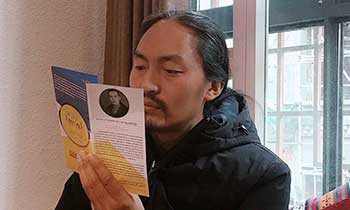 Gangkye Drubpa Kyab is a 42-year-old Tibetan writer and former political prisoner who was arrested on the evening of March 23, 2021. According to recent information, Drubpa Kyab was sentenced in September 2022 to 14 years in prison for “inciting separatism” and “endangering state security.”
Gangkye Drubpa Kyab is a 42-year-old Tibetan writer and former political prisoner who was arrested on the evening of March 23, 2021. According to recent information, Drubpa Kyab was sentenced in September 2022 to 14 years in prison for “inciting separatism” and “endangering state security.”
Serta County police previously arrested Drubpa Kyab on the evening of Feb. 15, 2012. The people’s court in Nyagchukha (Yajiang) County sentenced him on Aug. 1, 2013 to five and a half years in prison. The people’s court then charged him with “sending information to the outside” and “inciting separatism,” which included co-founding the “Protest group against Communist China.” At the time, Drubpa Kyab was a teacher at a Tibetan private local school in Drango County founded by Khenpo Tsultrim Lodoe (a renowned abbot of the prominent Buddhist institute Larung Gar).
Drubpa Kyab was released early on Sept. 16, 2016 on suspected health grounds, although it is not certain. After his release, county police detained him the following day for 17 days as punishment for holding a photo of the Dalai Lama on his head and other disobedient behavior. Due to torture, forced labor and poor food in prison, Drubpa Kyab suffered from malnourishment and developed multiple health complications, including loss of vision and amnesia, as well as heart and kidney problems. Drubpa Kyab’s digestive system also suffered severe deterioration.
His arrest and imprisonment were connected to his writings about the circumstances and future of the Tibetan struggle. His writings were widely published in magazines and books such as the “Call of Fate,” “Suffering of the Time,” “Tears of Today,” “Hues of the Time,” “White Scarf Journal” and especially his book, “The Blood-red Chronicles of 2008.”
According to his identification documents, Drubpa Kyab was born on Aug. 6, 1981. His parents are Thupten Nyima and Wangthang Dolma. Drubpa Kyab resides in Seke town in Serta County, Kardze Prefecture. He and his wife Wangchuk Lhamo have two children, 16-year-old Mewang Kyi and 14-year-old Gang Tsenpo.
Tsering Dolma (Cairang Zhuoma, 才让 卓玛)
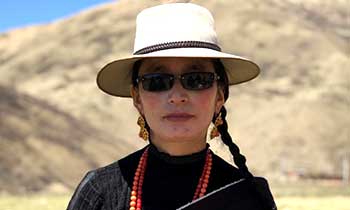 Tsering Dolma was arrested by Serta County police on April 2, 2021 and recently sentenced to eight years in prison. Dolma is a Tibetan activist and former political prisoner from Gangtsa (Gang ca) village, Taktsa (Daze) Township. She has been detained twice. Dolma was first detained on June 1, 2008 for participating in protests against Chinese rule in Tibet. She was then detained a second time in 2012 for allegedly protesting alongside her father against Chinese rule. During each arrest, she was allegedly seriously beaten for disobedient behavior and now suffers lasting health complications, including amnesia, epileptic fits, heart disease and a broken elbow. Since her release, her movements have been restricted.
Tsering Dolma was arrested by Serta County police on April 2, 2021 and recently sentenced to eight years in prison. Dolma is a Tibetan activist and former political prisoner from Gangtsa (Gang ca) village, Taktsa (Daze) Township. She has been detained twice. Dolma was first detained on June 1, 2008 for participating in protests against Chinese rule in Tibet. She was then detained a second time in 2012 for allegedly protesting alongside her father against Chinese rule. During each arrest, she was allegedly seriously beaten for disobedient behavior and now suffers lasting health complications, including amnesia, epileptic fits, heart disease and a broken elbow. Since her release, her movements have been restricted.
According to the exile Tibetan news site Tibet Times, Dolma is married to Karma Wangchuk and has two boys.
Samdup (Sangzhu, 桑珠)
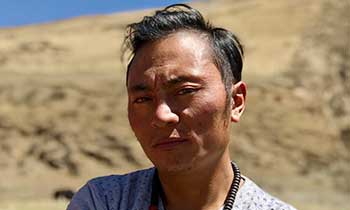 On April 5, 2021, Serta (Seda) County police allegedly arrested Samdup, who is now 40 years old. Samdup has since reportedly been sentenced to eight years in prison on charges of “inciting separatism” and “endangering state security.” Samdup previously began a five-year prison term in June 2012 for supporting the Tibetan political struggle and co-founding the “Protest group against Communist China.” After his early release on Aug. 19, 2016, he was detained a month later on Sept. 18, 2016 and held for 17 days at the county police station.
On April 5, 2021, Serta (Seda) County police allegedly arrested Samdup, who is now 40 years old. Samdup has since reportedly been sentenced to eight years in prison on charges of “inciting separatism” and “endangering state security.” Samdup previously began a five-year prison term in June 2012 for supporting the Tibetan political struggle and co-founding the “Protest group against Communist China.” After his early release on Aug. 19, 2016, he was detained a month later on Sept. 18, 2016 and held for 17 days at the county police station.
Samdup was born in 1982 to Sogyal and Jedhey in Gochok (Guoqiong) village in Serta County, Kardze Tibetan Autonomous Prefecture, Sichuan.
Gangbu Yudrum (Gangbu Youbo, 岗布优博)
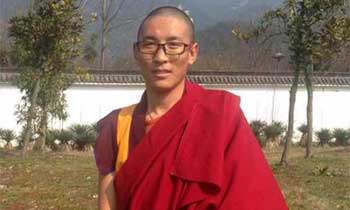 Gangbu Yudrum (also known as Yudrum) was arrested March 22, 2021 and sentenced to seven years in prison in September 2022. Yudrum is a monk from Tagdrak (Dou zha) Village, Rinthon (Ranchong) Township, Serta County, Kardze Prefecture, who has previously served two prison terms. He was first imprisoned for three years for protesting, raising the Tibetan national flag and calling for the return of His Holiness the 14th Dalai Lama. He was released on Feb. 19, 2011 but arrested again on May 14, 2012 and imprisoned for two years for co-founding a “Protest group against Communist China” that organized various campaigns across Tibet. According to a reliable source in exile, Yudrum was the founder of the protest group.
Gangbu Yudrum (also known as Yudrum) was arrested March 22, 2021 and sentenced to seven years in prison in September 2022. Yudrum is a monk from Tagdrak (Dou zha) Village, Rinthon (Ranchong) Township, Serta County, Kardze Prefecture, who has previously served two prison terms. He was first imprisoned for three years for protesting, raising the Tibetan national flag and calling for the return of His Holiness the 14th Dalai Lama. He was released on Feb. 19, 2011 but arrested again on May 14, 2012 and imprisoned for two years for co-founding a “Protest group against Communist China” that organized various campaigns across Tibet. According to a reliable source in exile, Yudrum was the founder of the protest group.
Seynam (Sai lang, 塞朗)
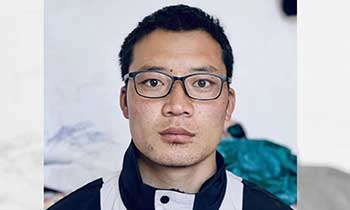 Seynam, approximately 33 years old, was detained on March 23, 2021 and sentenced to six years in prison in September 2022. Police in Serta County previously detained him for 15 days, starting Sept. 15, 2020, along with 10 other Tibetans for holding a meeting on the “welfare of Tibetan parents.”
Seynam, approximately 33 years old, was detained on March 23, 2021 and sentenced to six years in prison in September 2022. Police in Serta County previously detained him for 15 days, starting Sept. 15, 2020, along with 10 other Tibetans for holding a meeting on the “welfare of Tibetan parents.”
Seynam is a Tibetan writer, an environmentalist and a Tibetan language educator from Togtsa (Duoca) village in Rinthon (Ranchong) township, Serta County. His father’s name is Dungkar and mother’s name is Liutso. Seynam also has a wife and daughter at home.
Pema Rinchen (Baima Renqin, 白玛仁钦)
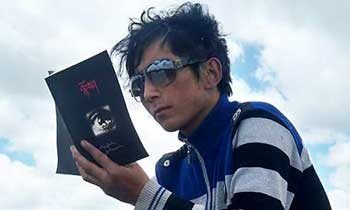 According to recent information, Pema Rinchen was sentenced to four years in prison last month. A young man in his 30s from Drango (Luhuo) County in Kardze Tibetan Autonomous Region, Rinchen has a sister and a mother who suffers from a chronic illness.
According to recent information, Pema Rinchen was sentenced to four years in prison last month. A young man in his 30s from Drango (Luhuo) County in Kardze Tibetan Autonomous Region, Rinchen has a sister and a mother who suffers from a chronic illness.
Rinchen was initially disappeared in late 2020 after some of his friends mentioned the prospect of Rinchen writing a second book. Authorities held Rinchen incommunicado for almost two years before sentencing him to four years in prison in September 2022.
Rinchen had previously been arrested by the County Public Security Bureau in Drango in Kardze County on July 5, 2011. At the time, he was severely beaten and admitted to a local hospital the following day. It is believed that Rinchen was initially arrested for a self-published book titled “Look.” In the book, Rinchen strongly condemns the policies of the Chinese Communist Party in Tibet and the brutal crackdown on the mass peaceful protests in 2008, as well as the inadequate response to the devastating earthquake in Kyegudo in 2010. The book contains the author’s interviews with many Tibetans who had participated in the peaceful protests that shook Tibet in 2008. The Public Security Bureau therefore arrested Rinchen under the charge of “inciting ethnic hatred.”
Since this initial arrest, Rinchen has experienced heavy surveillance and close watch by security personnel. During sensitive events, local police often summoned him to their station and questioned him.

